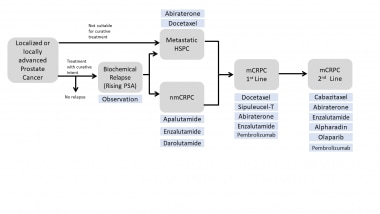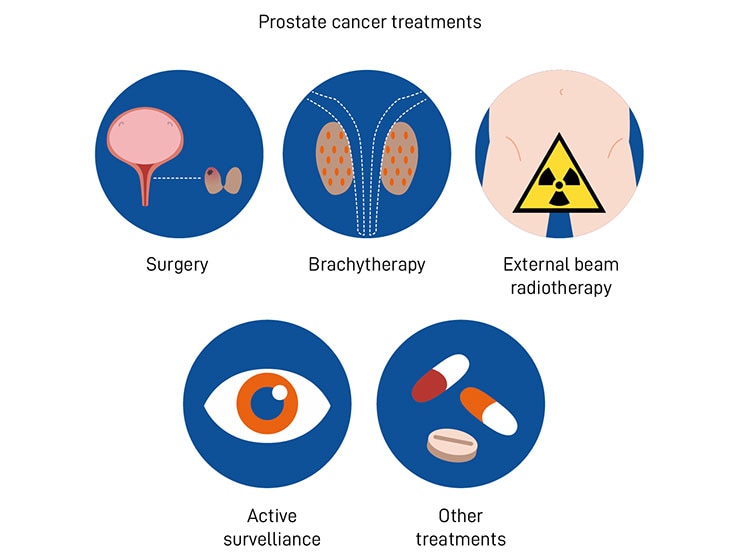Prostate Cancer Therapy: Surgical and Non-Surgical Approaches Explained
When faced with a prostate cancer cells diagnosis, the range of therapy options can appear frustrating. This detailed review aims to drop light on the complexities of prostate cancer therapy, supplying understandings into the details of each technique to empower people in making informed choices concerning their health.
Surgical Treatment Options
When thinking about surgical treatment options for prostate cancer, patients and doctor often weigh the risks and benefits related to various treatments. One typical medical technique is radical prostatectomy, which entails the elimination of the whole prostate gland. This procedure is typically advised for people with localized prostate cancer and uses the possibility for a cure. Extreme prostatectomy can lead to side effects such as urinary incontinence and erectile disorder.
An additional medical choice is robotic-assisted laparoscopic prostatectomy, a minimally invasive treatment that makes use of a robot system to help the specialist in eliminating the prostate. This technique can cause much less blood loss, much shorter health center keeps, and much faster recuperation times contrasted to standard open surgical procedure. It also lugs the danger of complications such as infection and injury to bordering organs.
Inevitably, the option of surgical therapy for prostate cancer relies on various variables consisting of the stage of the cancer, the person's general health, and their choices pertaining to prospective negative effects and recuperation times. Consulting with a multidisciplinary group consisting of urologists, oncologists, and radiation oncologists can assist individuals make notified choices concerning one of the most ideal medical method for their individual instance.

Non-Surgical Therapy Alternatives
Considering options to medical treatments, non-surgical therapy choices for prostate cancer cells offer individuals extra avenues for managing the illness while decreasing possible medical dangers. One non-surgical method is Energetic Monitoring, where clients with low-risk prostate cancer cells are monitored closely with regular examinations, blood examinations, and biopsies, without undergoing instant treatment. This technique intends to stay clear of unnecessary treatment and its connected side impacts, such as urinary incontinence and erectile disorder.
One more non-surgical option is Radiation Treatment, which utilizes high-energy rays to eliminate cancer cells (Best prostate cancer hospital in India). This therapy can be provided externally utilizing a device (Outside Light beam Radiation) or inside via tiny contaminated pellets put near the tumor (Brachytherapy) Radiation therapy can be made use of as a main treatment or in combination with other treatments, such as hormonal agent treatment
In Addition, Hormonal Agent Treatment is a non-surgical strategy that intends to minimize the levels of male hormones (androgens) in the body, as these hormones can fuel the development of prostate cancer cells. By obstructing or lowering androgen levels, hormone therapy can reduce down cancer progression and alleviate symptoms in sophisticated instances.
Robotic-Assisted Surgery for Prostate Cancer Cells

One of the essential benefits of robotic-assisted surgical treatment for prostate cancer is its capability to minimize the danger of difficulties and adverse effects commonly associated with open surgery, such as blood loss, pain, infection, and extended recovery times. Clients undergoing robotic-assisted procedures typically experience much shorter medical facility remains, less postoperative pain, and faster return to regular tasks. In addition, the minimally intrusive nature of robotic surgery generally leads to smaller sized cuts, causing enhanced aesthetic results and minimized scarring for clients. In general, robotic-assisted surgery represents a cutting-edge strategy to prostate cancer cells treatment that incorporates technical improvements with surgical knowledge to optimize person results.
Radiation Therapy for Prostate Cancer
Utilizing innovative radiation innovation, radiation treatment plays an important duty in the thorough treatment of prostate cancer cells. Radiation therapy utilizes high-energy radiation to damage cancer cells and shrink growths. It is an usual treatment choice for prostate cancer cells, either as a key treatment or in combination with surgical procedure, hormone therapy, or radiation treatment.
There are these details two main kinds of radiation treatment made use of for prostate cancer: outside light beam radiation treatment (EBRT) and brachytherapy. In EBRT, a machine provides radiation from outside the body to the prostate. This therapy is commonly provided over a number of weeks, with day-to-day sessions lasting just a couple of minutes (best prostate surgeon in Mumbai). Brachytherapy entails positioning radioactive seeds or sources directly into the prostate near the cancerous cells. These seeds send out radiation that kills the cancer cells in time.
Radiation therapy for prostate cancer is highly effective, with high cure prices, specifically for local cancer cells. It is additionally a beneficial alternative for individuals that might not appropriate prospects for surgical procedure. Like any treatment, radiation treatment might have side results, such as urinary system issues, exhaustion, and skin irritation, but these are convenient and often short-term.
Hormonal Agent Treatment for Prostate Cancer Cells
Hormone therapy is a generally used treatment approach for prostate cancer management. Hormonal agent treatment, additionally understood as androgen starvation treatment, intends to minimize testosterone levels in the body or obstruct the hormonal agent's effects on the prostate cancer cells, thus slowing down the disease's progression.
There are different sorts of hormonal agent therapy for prostate cancer, including medications that reduced testosterone levels (such as luteinizing hormone-releasing hormonal agent agonists and villains), or drugs that obstruct testosterone from getting to cancer cells (like anti-androgens) Hormonal agent therapy can be used alone or in combination with other therapies like radiation treatment, depending upon the stage and aggression of the cancer cells.
While hormonal agent treatment can effectively manage prostate cancer cells growth, it may come with side effects such as hot flashes, loss of sex drive, erectile disorder, and osteoporosis - Best prostate cancer doctor in Mumbai. Regular tracking and discussions with doctor are essential to take care of these side impacts and make certain the treatment's performance
Verdict
Finally, the therapy choices for prostate cancer include surgical and non-surgical approaches such as robotic-assisted surgery, radiation therapy, and hormone treatment. Each method has its very own advantages and risks, and the choice of treatment relies on go to the website various factors such as the stage of cancer and overall health of the individual. It is very important for patients to talk about these alternatives with their doctor to establish one of the most suitable strategy for their private situation.

Using sophisticated radiation innovation, radiation treatment plays an essential role in the detailed therapy of prostate cancer cells. It is an usual therapy alternative for prostate cancer cells, either as a main therapy or in mix with surgical procedure, hormone therapy, or chemotherapy.
Radiation treatment for prostate cancer is highly efficient, with high cure rates, particularly for localized cancer cells.Hormone treatment is a generally utilized treatment technique for prostate cancer cells administration.In conclusion, the therapy choices for prostate cancer cells include medical and non-surgical techniques such as robotic-assisted surgical treatment, radiation treatment, and hormone treatment.
Comments on “Fascination About Best Prostate Cancer Doctor”